GOH: Giving A Glimmer of Hope to Visually Impaired Children in Sudan

Visual impairment remains a major public health problem in Sudan, with at least 1.5% (600,000 people) of its population being visually impaired, mostly due to cataract, glaucoma, onchocerciasis, refractive error, trachoma and corneal scarring.
Although more than 75% of visual impairment in Sudan is due to avoidable causes, many of those who are visually impaired cannot receive the healthcare they need because they come from poverty and live outside of Sudan’s capital, Khartoum, where most hospitals, private clinics and specialists are concentrated. Approximately 70% of eye care is found in Khartoum. As a result, many of the visually impaired people in Sudan depend on begging to survive.
Helping to improve the livelihood and education of visually impaired people in Sudan is the non-profit Glimmer of Hope (GOH) Organization. Established in 2010, GOH specialises in ensuring the rights of people with visual impairment in Sudan are met. In addition, GOH challenges negative perceptions within society towards people with visual impairment to create a conscious and effective society that directs its energies to serving them.
Working with local and international entities, GOH helps improve and develop education for children with visual impairment by providing the tools, resources, healthcare and environment they need to enhance and prosper in their livelihood.
500 Words Magazine interviews founder and chairman of GOH, 34-year-old Abualabass Elmahdi, who is currently running GOH from afar in Canada.
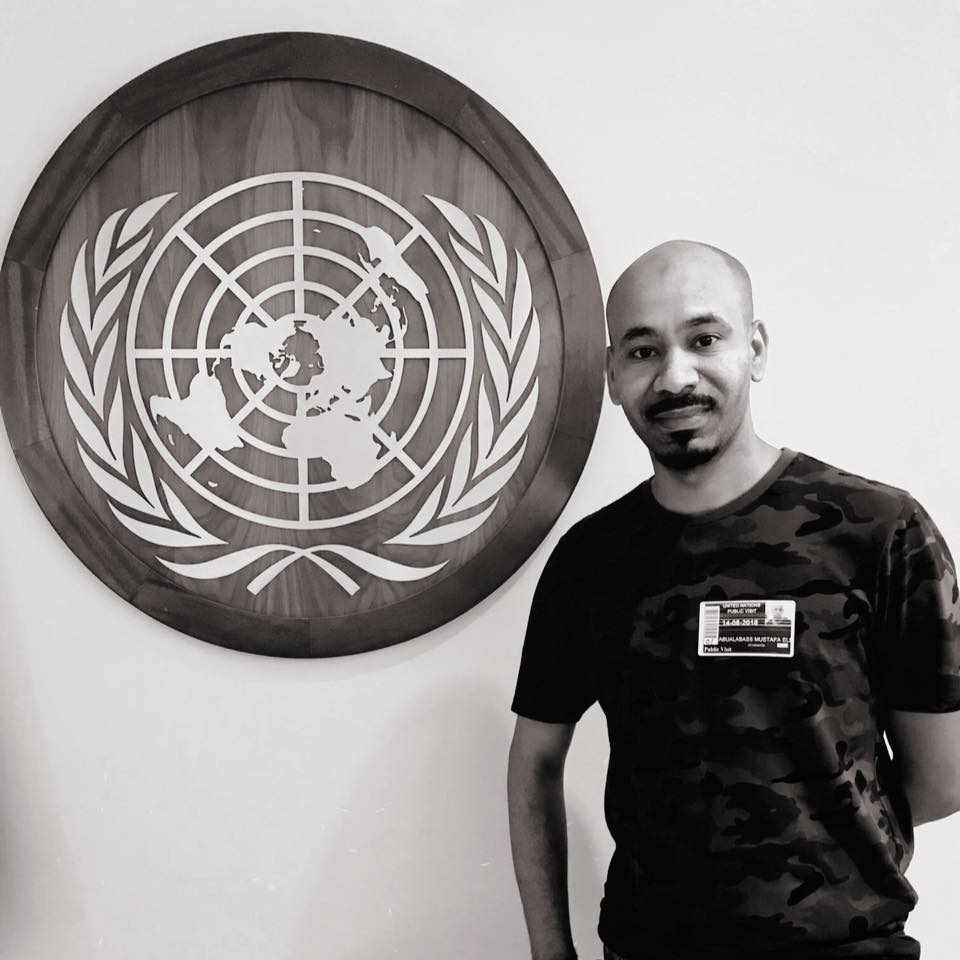
What inspired you to establish Glimmer of Hope (GOH) Organization?
My journey as a volunteer in the humanitarian and development field started in 2006. I used to volunteer in various sectors such as orphanages, homeless and elderly shelters, children with cancer and rehabilitation centres. Yet, I felt we, as volunteers, had no impact, at least the impact I desired we have. There was so much wasted effort and resources. I decided to form an official body that organises, optimises, mobilises and concentrates on all these efforts and resources in one specific sector. I believe this the professional way to achieve any positive and sustainable change.
Why is GOH specifically dedicated to or focused on the blind and visually impaired in Sudan?
In 2009, I noticed there were so many active NGOs and initiatives in other sectors. Yet, there are only a few dedicated to serving the blind and visually impaired people. This is when I knew that this segment deserves all of our attention and efforts. It was so clear that we could play a significant role in developing and improving this sector by empowering people with visual impairment through education. We felt we are the hope they need, that’s why Glimmer of Hope organization (GOH) founded in June 2010.
How specifically are you helping improve education of the blind and visually impaired people in Sudan?
At the beginning, GOH started with rapid response and emergency activities like maintenance of the National Rehabilitation Centre of the Blind and Al-Nour Institute for the Blind to providing essential winter needs for the resident children in Al-Nour Institute as well as psychological, medical and logistical support to the administration and children alike.
The exposure and knowledge we gained by working closely with the beneficiaries helped us reshaping our strategic goals. Our goal is to improve the education of people with visual impairment all over Sudan, which narrowed our scattered project toward the very specific and clear strategical goal.
Now, we are aware it’s not an easy task, taking in consideration that 80% of the children with visual impairment never attended any formal education. There’s Braille illiteracy, lack of the educational tools, and most importantly, the schools’ environment is not suitable for the children with visual impairment. And there are many more challenges.
GOH established the first National Audio Library, which strives to provide the official curriculum in a user-friendly and convenient audio format.
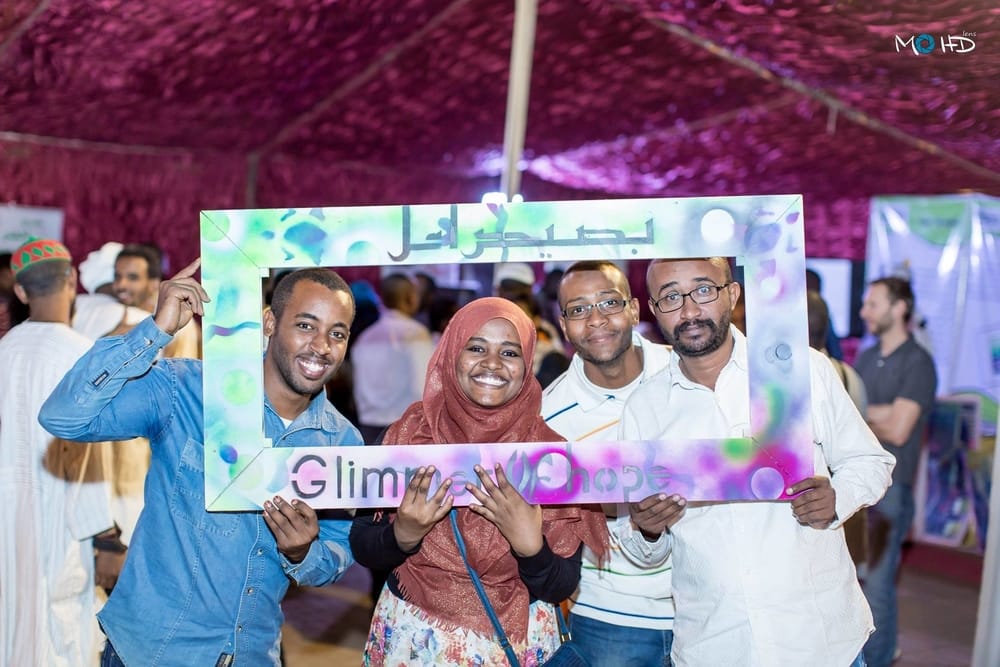
Since 2010, what has GOH accomplished? What impact have you made thus far?
With the devotion and dedication of our volunteers and stakeholders we successfully managed to provide these services and projects:
- Providing students of Al-Nour Institute for the Blind with psychological support and ensuring their integration into society.
- Sponsored successful eye surgeries for two children who now see light.
- Built a clinic inside Al-Nour Institute to sustain the health services for resident students.
- Fully covered the lack of the Braille tools in two schools for the blind in Khartoum and Al Jazirah. For the first time, each child owned her/his own Braille tools.
- Coordinated advanced training by British experts for teachers of Al-Nour Institute and in Wad Madani, Al Jazirah.
- Increased the academic degrees and educational level of students of Al-Nour Institute through our academic strengthening programme.
- Coordinated and facilitated funds with the Korean Embassy.
- Planned and executed one of the biggest awareness campaigns, Alnour Stand, for the visually impaired in Sudan, in a partnership with Education Without Borders.
- Promote the right of education of the visually impaired people.
- Train and sponsor low-income families of blind children.
- Empowered and funded talented visually impaired children to make handmade accessories and sell them, in partnership with Oak Foundation.
- Converted 60% of the official curriculum into audio books.
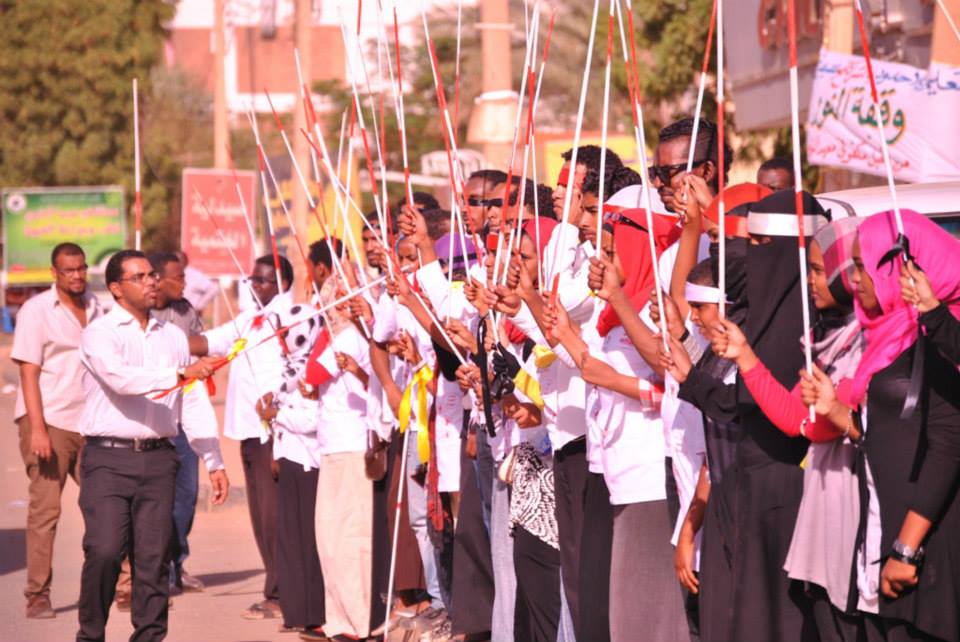
Can you share a few stories of individuals whose lives have changed because of GOH?
Mussab Khalil is a visually impaired student who was studying and living at the accommodation of Al-Nour Institute. He is also a talented musician. He used to score low grades due to the lack of tools and academic support. When we started providing our services, we noticed a huge improvement in his grades. Even after he left to secondary school, he still keeps receiving academic support from our volunteers. Most importantly, he was the first one who benefited from the Audio Library project, which is why he scored a high grade in secondary school.
Mussab used to tell us that GOH is all the hope, and started volunteering with us, even managing a whole awareness event by himself. We nominated Mussab on behalf of GOH to participate in a capacity building and professional NGO management programme, which improved his skills and knowledge to high-class level. Now, he is one of the strongest nominees to the Executive Office. Mussab became our role model and gave us hope and indication that we are going on the right way. Mussab has now become a family member.
What challenges are you facing running the non-profit organisation, GOH?
Basically, most of the NGOs face the same issues such as high turnover rate of its members due the economic situation, and covering the running and logistical expenses. I believe these are the main challenges we are trying to overcome, specially now we are targeting hundreds of thousands of students with visual impairment all over Sudan with huge projects that require dedicated staff.
Is the organisation a small grassroots operation with little money or does it have financial support/aid?
GOH is not a small organisation anymore. Our scope is big. We follow professional and scientific approaches to achieve our goal and deliver our projects. Therefore, our running expenses are increasing due to the national projects we started implementing such as the National Audio Library. More planned projects are on hold because we are struggling in funding our projects and operations.

Tell us about your current projects and how the public can help?
The National Audio Library is resuming again after the revolution. We need volunteers to participate in recording and coordinating the sessions.
We also formed a Research Unit that specialises in diving deeply in the informational aspect to provide statistics, studies and scientific research that would support the organisation’s orientation on scientific and studied grounds, which will also contribute to increasing the professionalism and credibility of the organisation locally and globally. We need volunteers with background in writing scientific papers.
Furthermore, we need IT development volunteers to be part of our planned Blind Information System (BIS), which aims to fulfil and achieve our strategic goal – contribute to providing accurate statistical information of people with visual impairment.
We also have other projects, which require the government to carry on its own agenda. We have approached the transitional government on this matter.
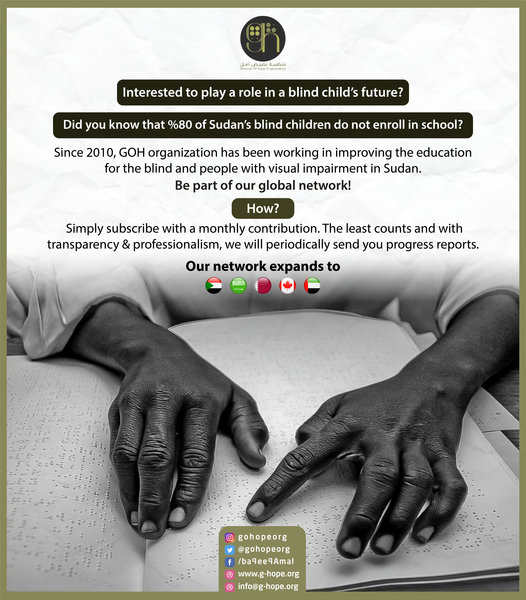
We created and launched our International Contributors Network to offer the opportunity to everyone who believe in our cause and want to be part of it financially. Our network reach Sudan, KSA, UAE, Qatar, Oman, Canada and USA. And still expanding.
What are your goals and how much money do you need to accomplish your goals?
To complete the current National Audio Library project, we just need to cover our monthly operational expenses which is at least USD600. As we are a project-based organisation, we separate each project’s budget and team. The estimated budget for Blind Information System (BIS) is USD20,000. Another planned project aims to achieve a national self-sufficiency of the Braille tools, which cost around USD22,000 in the first phase.
For more information on GOH, visit g-hope.org. or their Facebook page, Glimmer of Hope Organisation (Glimmer of Hope Organisation) @ba9ee9Amal.

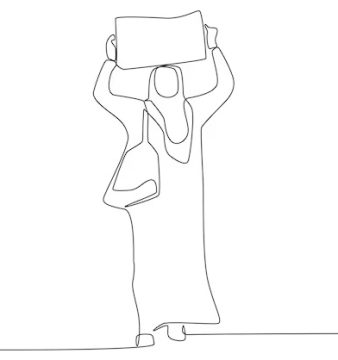
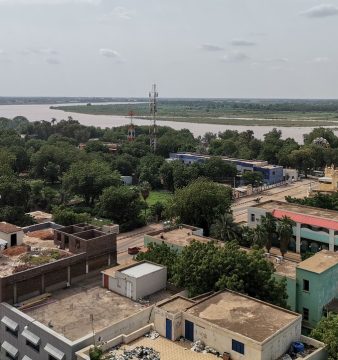
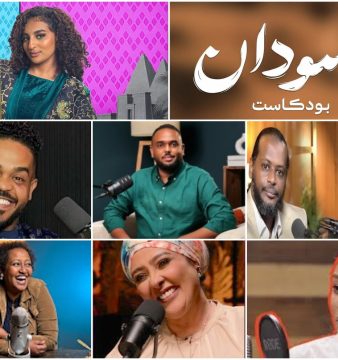

Thanks 500 words for interviewing GOH.
We believe everyone could be visually impaired in any minute.
visually impaired people are us.